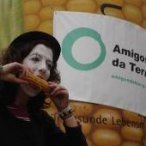English · Español

15 April 2009 | News | Food Sovereignty
Killer Maize
Germany bans GM maize MON 810 due to damages to the environment
Length: 2 minutes 12 seconds
Download: MP3 (1.5 Mb)
The German government decided to ban the use of GM maize MON 810 because it implies risks to the environment. This is what German agriculture minister, Ilse Aigner, said in a press conference on Tuesday.
“There is enough evidence that implies that MON 810 maize is detrimental to butterflies and ladybirds ecosystems and all kind of sea organisms”, stated Aigner, who belongs to the conservative Christian Social Union and also said that her measure was based on scientific reasons, not political questionings.
According to Aigner, there is enough evidence that document that this variety of genetically modified maize –produced by US multinational company Monsanto, also damages the immune system of mice.
Despite the fact that since 1998 MON 810 is authorized within the European Union, five other European countries –France, Austria, Hungary, Luxembourg, and Greece, have questioned the European Commission´s directive and have temporarily banned the cultivation of this variety of maize in their territories. And it is also not grown in Italy and Poland.
In Germany, MON 810 started to be cultivated in 2005, and last year, near 3,600 hectares of the country were planted with it.
When the German government´s decision was made public, Monsanto authorities said the ban was “incomprehensible”, because a large number of scientific research confirmed the maize was “safe for the environment”. This is why they argued that they will likely submit legal actions to authorize GM maize in Germany again.
However, Aigner explained that before making the decision she analysed studies conducted by the Institute for the Protection of Environment, the Julius-Kühn federal institute and even some material created by Monsanto itself. And the conclusions were indisputable: MON 810 GM maize pollutes the environment, and that is why it should not be grown in Germany.
Imagen: Amigos de la Tierra







